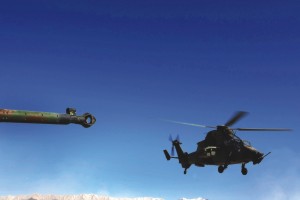Neighbours
Lull after the Storm
Bunn Nagara
 East Asia and China watchers have been abuzz all week over the US announcement of new arms sales to Taiwan, and China's reaction against that. East Asia and China watchers have been abuzz all week over the US announcement of new arms sales to Taiwan, and China's reaction against that.
The US$6.4 billion deal is said to be part of a US$11 billion package previously agreed to by the George W. Bush administration. China has always protested such arms sales, but this time with greater stridency.
In a protest statement last weekend, Beijing suspended military exchanges and several scheduled security talks with the US, while warning them about setbacks in cooperation on various international issues. It also warned the US about sanctions against US firms involved in the Taiwan arms deal. The US regards the sale as part of its 1979 Taiwan Relations Act (TRA), and as allowing Taiwan to take better care of its own defence while relying less on US military intervention in contingencies. Taipei sees a stronger defence as allowing it to deal more confidently with Beijing, which it has had to do more of in recent years.
However, Beijing considers such arms sales as needlessly provocative, even as an attempt to embolden Taiwan’s pro-independence lobby, since the island's military hardware is pointed only at the Chinese mainland. US and Taiwanese proponents of the deal in turn see the mainland's weapons aimed specifically at Taiwan.
All this is now happening despite the best cross-Straits relations in years. The mutual claims, complaints and allegations therefore appear quite paradoxical. What is not officially stated in Taipei is that the Kuomintang (KMT) government of President Ma Ying-jeou is under pressure from the independence-inclined opposition Democratic Progressive Party (DPP), which over a number of issues sees the KMT as being too Beijing-friendly.
Taipei is due to conclude an Economic Cooperation Framework Agreement (ECFA) with Beijing within the next few months, which would be a lifeline for Taiwan given the relentless economic pull from Beijing. Although the ECFA could benefit Taiwan more than China in what should be a non-political issue, the DPP has chosen to interpret it in loaded partisan terms.
Taiwan is also embroiled in a rough exchange over an earlier ban on imported US beef, involving an incumbent KMT, a populist DPP recently angling for by-election votes, and the US as their trading partner. Given these encumbrances, the US arms deal might just seem like a soothing balm for the KMT's political image and fortunes.
However, none of it would mitigate Beijing's huffing and puffing. The US weapons systems destined for Taiwan include Patriot missiles, Black Hawk helicopters and Osprey-class minesweepers.
At the same time, China must also know that the US does not seem too enthusiastic this time in pursuing a fully-fledged arms sale. Taiwan has complained that Washington still refuses to sell the weapons systems it wants most - F16 fighter jets and submarines - while raising the price for other hardware it would sell.
The DPP has again turned the issue around to aim it squarely at the KMT government, citing failure in buying needed equipment and wasting taxpayers' money on less valuable items. This has made both the KMT and the DPP even more determined to press the US for the jets and submarines.
Still unimpressed, China has accused the US of reneging on the 1982 Joint Communiqué in which Washington pledged to limit its arms sales to Taiwan, and to work to reduce the scope of such sales until the problem of cross-Straits relations is peacefully resolved.
Within the US, the TRA as a treaty enjoys the force of law, which the Joint Communiqué as a declaration does not. Over the years, both Washington and Beijing have traded accusations of betraying the spirit of the Joint Communiqué by positioning weapons on both sides of the Taiwan Straits.
For China today, it seems particularly unacceptable that the US should value a renegade province's TRA over a rising mainland's Joint Communiqué. And thus the display of righteous exasperation.
Some analysts see China's threat of sanctions against US firms that supply weapons to Taiwan as signifying China's global economic clout. This is indeed a growing phenomenon - companies like Boeing and Lockheed Martin, as ever competing against Europe's Airbus, may have to weigh the option of selling Taipei several fighter jets against that of selling Beijing nearly 4,000 civilian aircraft over the next 18 years.
Even more important for the US may be China's threatened withdrawal of diplomatic cooperation over a range of pressing issues: North Korea, Iran, Afghanistan, Burma and global warming. North Korea's nuclear weaponry irks US allies Japan and South Korea, while Iran's nuclear plans unsettle major US ally Israel.
This series of events happens to come at a bad time for US-China relations. Among other things, President Barack Obama's postponed meeting with the Dalai Lama is now about to take place, which can be expected to set back bilateral relations further.
China's firm reaction against the proposed US-Taiwan arms deal, which some see as the strongest in three decades, may ultimately be aimed at the US Congress. Lawmakers there have a full month to block, impede or modify the proposed deal, and there is no telling if or how they would do so.
Ultimately, China may be protesting loudly because it might seem most unbecoming of it if it did not. Beijing and Washington well understand that there is far more at stake for both than a periodic commercial exercise of limited utility.
The smart betting now is on both to find swift, effective and quiet ways to overcome the present impasse.
Source: ANN
Copyright
(R) thedailystar.net 2010 |
